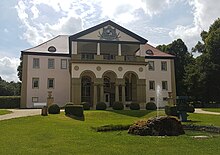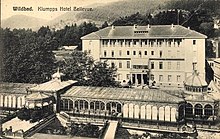Carl Ludwig Emanuel von Dillen
Carl Ludwig Emanuel von Dillen (born March 28, 1777 in Stuttgart , † October 1, 1841 in Dätzingen ) was the ancestor of the von Dillen-Bülow-Putlitz family.
Life
Carl Ludwig Emanuel Dillenius was a son of the Württemberg Rentkammerrat and later Court Chamber Councilor and Saline Director David Imanuel Dillenius and his wife Regina Magdalena, née. Märklin. He grew up in Mannheim , possibly completed an administrative legal training and from 1798 belonged to the staff of the ducal Marstall in Ludwigsburg . Friedrich von Württemberg made him second lieutenant of the Württemberg Leib-Jäger Regiment on horseback in 1799. Two years later he was raised to the imperial nobility by the Emperor in Vienna and was now called "von Dillen"; In 1806 he became a baron, in 1811 King Friedrich elevated him to the status of hereditary count. Within a decade Dillenius or von Dillen, who was awarded numerous medals, rose to lieutenant general and commander of the Guard Regiment on horseback. As a favorite of the elector or, from 1806, the king, he gained great influence at the court. In 1807 he became adjutant general of the king, in 1809 he became general-chief-manager of the royal palaces and vice-chief stable master.
In 1809/10 he was presented with Dätzingen Castle , which also included farm buildings and gardens. Von Dillen supplemented this property with land purchases, so that the Dätzingen manor was around 187 acres in size in 1864 . In 1815 he received the castle and manor Rübgarten as a crown loan. Again von Dillen added further land purchases to this property. The next five generations of the family could live on the property. Some contemporaries and later generations attributed the rapid rise and the rich gifts von Dillen received from his sovereign to a preference of Frederick I for handsome young men.
In his biography of Carl Maria von Weber, Max Maria von Weber expressed himself more than ungraciously about the conditions at the Württemberg court and especially about the Count von Dillen: “The court in Stuttgart and Ludwigsburg was extraordinarily colorful, it was teeming with court officials, favorites and preferred singers , the splendid uniforms [...] and at the king's evening circles, where Matthisson read aloud, now music was played, and now a number of uneducated but beautiful hunting squires and pages drove their mob-like demeanor, which amused the king, there was more as a lax tone. The most interesting but also the lowest and most despised and hated favorite of the king was General von Dillen [...] This Count Dillen completely ruled the king, enriched himself in every possible way with and without knowledge of him and especially cultivated the trade with state officials in the country most shameless form. [...] Dillen was the king's evil genius [...] The king spoke a lot and hastily, often full of spirit, but just as often enjoyed himself in clumsy jokes and rant. He could be very attractive, but too often fell into passionate affections of all kinds for one to be glad of his sociability. "
The General Encyclopedia of Sciences and Arts painted a similarly unfavorable picture of the Count : “The most decisive and damaging influence on Friedrich's vacillating character and especially his passion was won by a certain Dillenius, or Count von Dillen, as he called himself after his elevation to the nobility who rose from a rider boy to lieutenant general, superintendent and other important posts. Friedrich had become so completely the man's slave that he really feared him and did nothing against his will. Count Dillen knew how to seduce the king into even the most perverse and pernicious, by trying to stifle all the germs of good and noble in his heart. "
Eduard Vehse became even clearer in his history of the German courts since the Reformation . He described the people's hatred of the "beautiful young people whom the king kept around" and who made a career as a result, and declared Dillen the most important member of this "unclean society". "Stories unique in their kind [...] how Dillen worked on the king in order to induce him to do the most unworthy of a king" were in circulation, and General von Wolnahm said: "Life in Ludwigsburg [...] was almost even more disgusting than the one in Stuttgart, because [...] in his dealings one was actually limited to the king's favorites and they were allowed to openly display their roughness and meanness, especially whatever Uneducated first Mignon General von Dillen applies. It would be incomprehensible how the educated, ingenious king [...] could enjoy such absurd jokes [...] if his inherent inclination towards men did not explain this contradiction. "
After the death of King Friedrich, von Dillen was banned from the Württemberg court, all court offices removed and a ban on entering Stuttgart was imposed. However, the late king's widow, Charlotte Mathilde , continued to patronize him and employed him as chief steward at her widow's residence in Ludwigsburg.
Carl Ludwig Emanuel von Dillen is buried next to his wife in the cemetery of Dätzingen Castle.
Offspring and whereabouts of property
From the marriage of Carl Ludwig Emanuel von Dillens to Luise Henriette Schott von Schottenstein in 1806, the son Friedrich Wilhelm Carl von Dillen, born on February 15, 1807, lived on the estate and became Chamberlain of Württemberg. In 1841 he had the Hotel Bellevue built in Bad Wildbad . The renowned house remained in the family's possession until the beginning of the 20th century, when it was sold to the Klumpp family of restaurateurs from Wildbad.
Friedrich Wilhelm Carl von Dillen married Ida Freiin von Spiering. The two sons, Friedrich Wilhelm Carl (1831–1904) and August Friedrich Karl Ludwig (1837–1907), added the surname of their mother, who was the last of their gender, to their name in 1869. They both completed military careers. After the death of Friedrich Wilhelm Carl von Dillens, the older son inherited most of the property in Dätzingen and Rübgarten. From his marriage to Bertha Countess Reuttner von Weyl, the son Friedrich Wilhelm Karl August Moritz Heinrich Max von Dillen-Spiering (1856-1894) and the daughter Marie Julie Auguste emerged. While the son died childless, Marie von Dillen-Spiering married Alfred von Bülow in 1884 , which finally brought Dätzingen Castle into the possession of the von Bülow family. The von Bülow couple had four children; Bernhard Friedrich, Bertha, Alice and Gabriele. After Alfred von Bülow died in 1916, Bernhard Friedrich von Bülow inherited the property. He had initially embarked on a military career, but then worked as an estate manager. Married to Adrienne Gans zu Putlitz , daughter of Joachim Gans zu Putlitz , since 1910 , he died in 1937. His two sons died in World War II , leaving only Adrienne von Bülow and daughter Dorothee, who married Carl Erdmann Graf von Pückler in 1931 and was widowed in 1941, remaining as heiresses. In the following decades, they sold most of the property due to tax and inheritance problems. Adrienne von Bülow finally transferred Dätzingen Castle to the municipality in 1961.
literature
- Frank Raberg : Biographical handbook of the Württemberg state parliament members 1815-1933 . On behalf of the Commission for Historical Regional Studies in Baden-Württemberg. Kohlhammer, Stuttgart 2001, ISBN 3-17-016604-2 , p. 144 .
Web links
Individual evidence
- ↑ a b Bernd Heiden, became lord of the castle thanks to those beautiful blue eyes? , in: Gäubote, August 19, 2008
- ↑ Max Maria von Weber, Carl Maria von Weber. A picture of life , Volume 1, Leipzig 1864, p. 128 f.
- ^ JS Verlag and JG Gruber (eds.), General Encyclopedia of Sciences and Arts in alphabetical order , first section, 49th Theil, Leipzig 1849, p. 393
- ↑ Eduard Vehse, History of the German Courts since the Reformation , Volume 26, Section 4, Section 4, Hamburg 1853, pp. 65–68
- ↑ Plan of the cemetery (PDF; 289 kB)
- ↑ The fate of Dätzingen Castle ( memento of the original from October 26, 2014 in the Internet Archive ) Info: The archive link has been inserted automatically and has not yet been checked. Please check the original and archive link according to the instructions and then remove this notice. (PDF; 2.1 MB)
| personal data | |
|---|---|
| SURNAME | Dillen, Carl Ludwig Emanuel von |
| ALTERNATIVE NAMES | Dillenius, Carl Ludwig Emanuel |
| BRIEF DESCRIPTION | Favorite of the first Württemberg king and ancestor of the Dillen-Bülow-Putlitz family |
| DATE OF BIRTH | March 28, 1777 |
| PLACE OF BIRTH | Stuttgart |
| DATE OF DEATH | October 1, 1841 |
| Place of death | Dätzingen |



